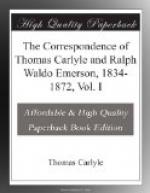My Dear Sir,—Some two weeks ago I received your kind gift from Fraser. To say that it was welcome would be saying little: is it not as a voice of affectionate remembrance, coming from beyond the Ocean waters, first decisively announcing for me that a whole New Continent exists,—that I too have part and lot there! “Not till we can think that here and there one is thinking of us, one is loving us, does this waste Earth become a peopled Garden.” Among the figures I can recollect as visiting our Nithsdale hermitage,—all like Apparitions now, bringing with them airs from Heaven or else blasts from the other region,—there is perhaps not one of a more undoubtedly supernal character than yourself: so pure and still, with intents so charitable; and then vanishing too so soon into the azure Inane, as an Apparition should! Never has your Address in my Notebook met my eye but with a friendly influence. Judge if I am glad to know that there, in Infinite Space, you still hold by me.
I have read in both your books at leisure times, and now nearly finished the smaller one. He is a faithful thinker, that Swedenborgian Druggist of yours, with really deep ideas, who makes me too pause and think, were it only to consider what manner of man he must be, and what manner of thing, after all, Swedenborgianism must be. “Through the smallest window look well, and you can look out into the Infinite.” Webster also I can recognize a sufficient, effectual man, whom one must wish well to, and prophesy well of. The sound of him is nowise poetic-rhythmic; it is clear, one-toned, you might say metallic, yet distinct, significant, not without melody. In his face, above all, I discern that “indignation” which, if it do not make “verses,” makes useful way in the world. The higher such a man rises, the better pleased I shall be. And so here, looking over the water, let me repeat once more what I believe is already dimly the sentiment of all Englishmen, Cisoceanic and Transoceanic, that we and you are not two countries, and cannot for the life of us be; but only two parishes of one country, with such wholesome parish hospitalities, and dirty temporary parish feuds, as we see; both of which brave parishes Vivant! vivant! And among the glories of both be Yankee-doodle-doo, and the Felling of the Western Forest, proudly remembered; and for the rest, by way of parish constable, let each cheerfully take such George Washington or George Guelph as it can get, and bless Heaven! I am weary of hearing it said, “We love the Americans,” “We wish well,” &c., &c. What in God’s name should we do else?




